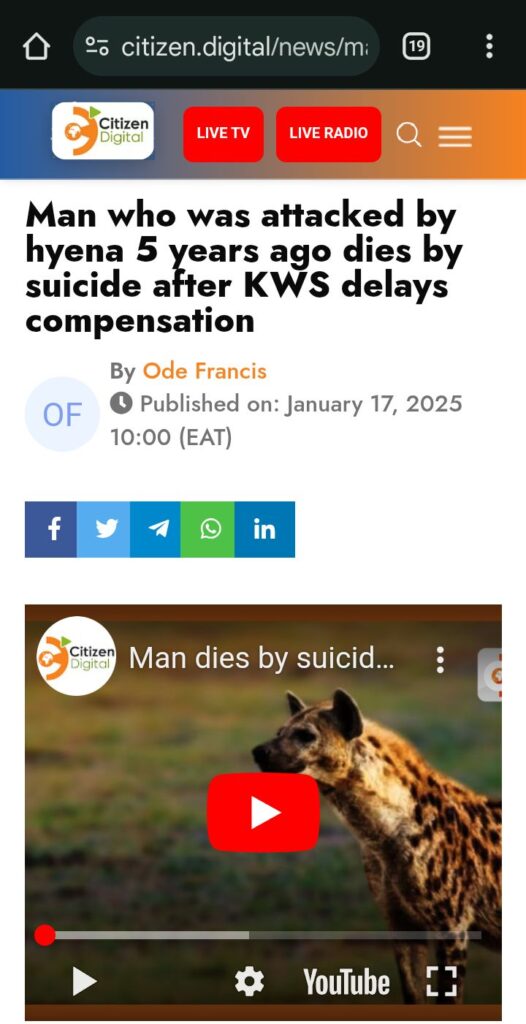Citizen TV reported on the tragic case of Dismas Kogo, a security guard from Ngong, Kenya, who had been severely injured in a hyena attack five years earlier.
The attack cost him one of his fingers and caused deep wounds to his leg. Afterward, Dismas sought compensation from the Kenya Wildlife Service (KWS), but despite his persistent efforts, he received no support.

During an interview with Citizen TV, Dismas expressed his frustration, revealing that the attack shattered his dreams of joining the army and put a heavy financial strain on his family.
His parents were forced to sell their belongings to pay for his medical expenses, and without any compensation, Dismas felt hopeless.
Tragically, Dismas died on January 1, 2025, after taking his own life.
His uncle, David Kiprito Leting, shared that Dismas had endured tremendous stress in trying to rebuild his life, only to be left empty-handed.
Leting narrated that the deceased had received a letter stating that compensation funds had been transferred to his bank account, but when he checked, no funds were available.
This added betrayal pushed Dismas to the edge, leading to his untimely death.
Citizen TV highlighted this heartbreaking story, shedding light on the failures within KWS, under the leadership of Director-General Erastus Kanga, KWS has faced growing accusations of corruption, inefficiency, and failure to support victims of human-wildlife conflict.
While KWS is supposed to protect wildlife and compensate affected communities, the organization has been slow to process claims, and many victims like in Dismas case are left in despair.
The case of Dismas Kogo is just one example of the larger systemic problems within KWS.
Additionally, the organization has been dealing with internal power struggles, including the suspension of senior managers during Dr. Kanga’s time at the helm.
These issues have only deepened public dissatisfaction and distrust.
Procurement scandals have also plagued KWS under Dr. Kanga’s leadership. Investigations have uncovered cases where taxpayers were charged double for KWS tenders, pointing to widespread financial mismanagement.
In response to these allegations, Dr. Kanga’s office has denied any wrongdoing, claiming that corrupt individuals are targeting the organization.
However, these excuses fail to address the deep-rooted issues plaguing KWS.
The combination of delays in compensating victims, internal conflicts, and procurement scandals has severely damaged KWS’s reputation and hindered its ability to fulfill its duties in both wildlife conservation and community relations.
The tragic case of Dismas Kogo, widely covered by Citizen TV, highlights the urgent need for reforms.
KWS must implement transparent processes, hold officials accountable, and streamline compensation mechanisms to restore public trust and better serve affected communities.
